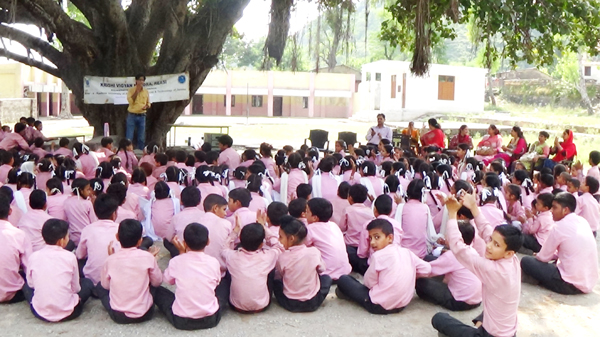 Early Times Report Early Times Report
Reasi, Sept 28: Krishi Vigyan Kendra (KVK), Reasi of Sher-e-Kashmir University of Agricultural Sciences and Technology-Jammu (SKUAST-J) organized awareness programme on Swachhta Hi Sewa campaign at Govt. Migrant Middle School, Talwara in Reasi district. The event was attended by more than 260 students and teachers. The programme was organised under the guidance and supervision of Associate Director Extension (ADE) and Incharge of KVKs of SKUAST-J, Dr. R.K. Arora. Scientist & Head of KVK, Reasi, Dr. Banarsi Lal initiated the programme with warm welcome of the participants. He explained the objectives of the campaign and said that Swachh Bharat Mission (SBM) was launched by the Prime Minister of India, Narinder Modi on October 2, 2014 with the objective to eradicate open defecation by 2019, the year that marks the 150th birth anniversary of Gandhiji, who wanted to make sanitation a priority in the country. He narrated that the Swachhata has become a national movement and all the sections of society should come forward in this national campaign so that country can be made clean, green and beautiful.
He stressed on the strenuous efforts for the waste management and said that garbage shouldn't be considered as the waste but wealth. He explained the scientific techniques for waste management. While highlighting the objectives of the Swachh Bharat Mission (SBM) the scientist said that campaign ultimately helps us to improve the quality of our life among by promoting the cleanliness, hygiene, eradicating the open defecation, motivating the different communities and Panchayati Raj institutions to adopt the sanitation practices, encouraging the appropriate technologies for ecologically safe and sustainable sanitation, scientific solid and liquid waste management for overall cleanliness. Dr.Banarsi appealed the participants to make Swacchta a habit in their daily routine whether it is school, home, neighbourhood etc. so that the sacred Swachhata Mission can be made successful.
He emphasised on the cleaning of drinking water areas, toilets, crop fields etc. He also suggested the techniques for the eradication of Parthenium Weed. He said the participants that this national level campaign can reduce disease infestation in human beings, animals and crops. |
